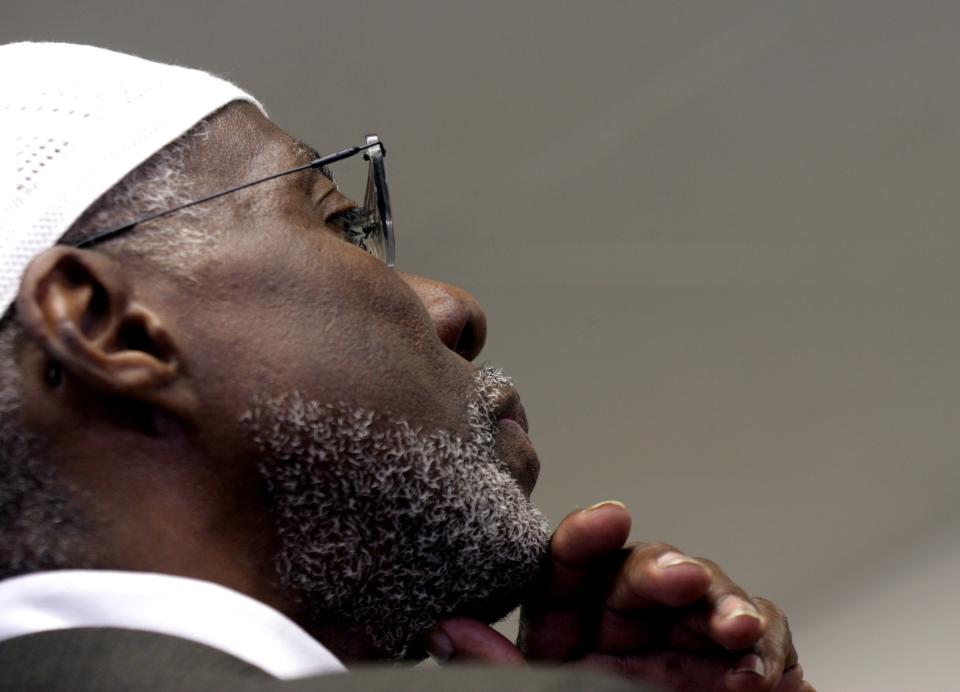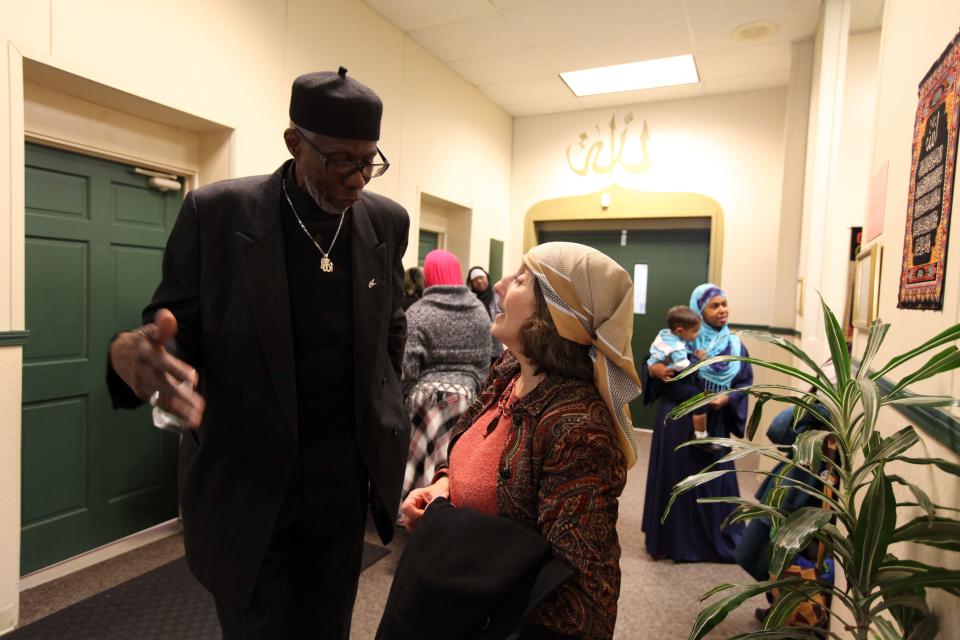Detroit Muslim leader remembered for faith and outreach
When Imam Abdullah El-Amin was in his early 30s, a childhood friend introduced him to Islam. It was the mid-1970s, a time of change in Detroit as the city's Black and Muslim population grew.
"He always used to come by my place and say, 'I have something that I know you will like,' " El-Amin recalled in a 2020 interview. "And I said, 'well, what is it, man?' He said: 'It's Islam.' So he kept bringing me tapes and books and we're talking about the religion and then finally, I took the shahada," the oath to Islam.
El-Amin was born as RasBerry Holland III in Little Rock, Arkansas, to Christian parents who moved to Detroit in search of a better life, part of a wave of Black migrants moving north. His conversion in 1976 led him into a new world of faith as he became a prominent leader in Michigan's Muslim, Black and interfaith communities who often engaged with Christians, Jews, and others. As a longtime leader with the Muslim Center in Detroit, El-Amin sought to promote unity among diverse groups within the Muslim community and also with other faith groups and races.
El-Amin died March 10 at the age of 78.
His funeral last week at the Muslim Center, the mosque on Davison Freeway he co-founded 40 years ago, drew hundreds of people inspired by his message. Gov. Gretchen Whitmer and Lt. Gov. Garlin Gilchrist issued a tribute to him, saying he "had a profound impact on his community."

Tall and trim, El-Amin was known for his generous smile and genial nature, often saying "God is good." But he also was outspoken on civil rights and social issues, not afraid to speak up during controversial moments to fight for justice. As the imam of the Muslim Center, he also struck a balance between conservatives and liberals within the Muslim community at a time when the faith was under the spotlight after the Sept. 11 attacks, conveying the message that Islam was a moderate religion of peace. He was a medical technologist working for 20 years at labs and hospitals in metro Detroit. And he also founded a funeral service for Muslims, Crescent Janazah Funeral Service, that helped families prepare and bury bodies in accordance with Islam. El-Amin was a frequent speaker at interfaith events and press conferences, often interacting with journalists and others to help educate on religious issues.
"Standing for justice and love, always having a soft tongue but his heart, his message always strong and mighty," Imam Mohammad Ali Elahi, leader of the Islamic House of Wisdom in Dearborn Heights, said at El-Amin's funeral. His death "is a big loss for Michigan," Elahi added on his website.
Imam Momodou Ceesay, a leader at the Muslim Center, said El-Amin became his mentor after he immigrated from Gambia. Ceesay recalled how El-Amin would always be interacting with people from different communities.
"He was a friend of all backgrounds of people," Ceesay said at the funeral. "You name it: Africans, Arabs, Pakistanis ... every Muslim. He shakes everybody's hands."
More:Joe Nader, the former executive chef at Ford Field, dies at 52
More:Father Norman Thomas, longtime Detroit priest, dies at 92

Dawud Walid, executive director of the Council on American Islamic Relations Michigan, moderated the funeral, praising El-Amin's legacy.
In 2012, El-Amin hosted a group of Jewish visitors during Friday services as part of his efforts to promote interfaith harmony.
“People think we’re supposed to be war all the time and be antagonistic," El-Amin told the Free Press about Jewish and Muslim communities in 2012. "But we see each other as brothers and sisters."
Rabbi Dorit Edut, an interfaith activist formerly with the Downtown Synagogue in Detroit who was a friend of El-Amin, spoke at his funeral.

He "was spiritual brother to me and to so many in the interfaith community," Edut said. She recalled how he would greet her by saying: "Shalom, sister." El-Amin supported Rabbi Edut when she created a new interfaith group called Detroit Interfaith Outreach Network (DION).
"He would always say yes when I invited him to speak or offer a prayer at our interfaith services all over Detroit," she said.
El-Amin moved to Detroit at the age of 7, traveling by train from Arkansas, according to an obituary posted to memorial website Ever Loved. He graduated from Detroit Public Schools, served in the U.S. Army during the Vietnam War at a supply depot in South Korea and attended Shaw College at Detroit, earning a B.S. degree in biology and chemistry in 1979.
In a 1998 profile in the Free Press, El-Amin recalled how he was persuaded to embrace Islam by the tapes his friend gave him: "There's a saying in the Koran that the truth will settle in your soul and your soul will know the truth. That's what happened to me. Listening to those tapes, the truth of Islam settled into my soul."
After converting to Islam in 1976, El-Amin became a follower of Hamtramck native Imam Warith Deen Mohammed after Mohammed broke off from the Nation of Islam following the death in 1975 of his father, Elijah Muhammad, the longtime Nation of Islam leader. The Nation of Islam was founded in Detroit in 1930 and founded its first house of worship in Detroit. El-Amin was not a member of the Nation of Islam, but several members of the Nation followed Mohammed after 1975. El-Amin hosted a forum in February 2007 at the Muslim Center that brought together the two groups for dialogue the same week the Nation held its annual convention in Detroit.

Before El-Amin became Muslim, he served as an acolyte at Plymouth United Church of Christ in Detroit under the Rev. Nicholas Hood Sr. After converting to Islam, El-Amin still maintained a relationship with the church and often worked with other Detroit ministers. He sometimes spoke out alongside them on social issues, expressing concern about declining morality in society. In 1996, he joined a group of Black Christian leaders to speak out against casino gambling. In 2001, he wrote an op-ed in the Free Press blasting rapper Dr. Dre for trying to show sexually explicit videos at a concert in Detroit that the city blocked.
"Dr. Dre and people like him infect society with the lowest, most despicable forms of entertainment available," El-Amin wrote. "It is unfortunate that many young people have never seen a movie without explicit sex and violence in it."
El-Amin was a neighborhood City Hall manager in 1994 under Mayor Dennis Archer. He ran for Detroit City Council in 2009, but didn't advance in the primary.
He traveled to Tanzania, Zanzibar, Palestine and the Philippines to help with various projects and made the hajj pilgrimage in Saudi Arabia in 1991.
"That was the ultimate human experience for me," El-Amin told the Free Press in 1998 of his hajj trip. "I could see the universality of man and the oneness of God. There were people around me from all the corners of the earth and they were there for one purpose: worshiping God."
El-Amin often spoke out against attacks on religious communities and extremism. He joined Jewish and Christian leaders in 2005 at the Islamic Center of America in Dearborn against the abuse of the Quran at Guantanamo Bay and in December 2015 against hatred at a press conference at the Islamic House of Wisdom.
He was the first executive director of the Council on Islamic Organizations of Michigan (CIOM), which is now called the Michigan Muslim Community Council. He helped unite Sunnis and Shias in metro Detroit, helping lead representatives to sign in 2007 at the Islamic House of Wisdom an agreement called the Muslim Code of Honor. A few years ago, he became Imam Emeritus of the Muslim Center as Ceesay assumed more of the mosque leadership.
While El-Amin stressed unity, he was outspoken in defense of the community after the FBI shot dead in 2009 a Detroit Muslim leader who was Black, Imam Luqman Ameen Abdullah, inside a warehouse in Dearborn in an undercover sting operation. El-Amin voiced concerns about the FBI's use of informants in Muslim communities and how agents conducted the operation, calling the alleged crimes involved "petty stuff" that didn't warrant such an operation.
El-Amin's mosque hosted the funeral for Abdullah and he drove the hearse that carried Abdullah's body to the cemetery in Canton where he was buried.

El-Amin penned a regular column in the Muslim Observer, a newspaper in Farmington founded in 1999, and wrote a book, "The Spiritual Adam: Your Guide to Power & Serenity," published in 2013. In 1998, he became editor in chief of a new newspaper for Muslims, the Muslim American.
In the book's preface, El-Amin calls upon Muslims to set aside small differences and focus on its teachings. He condemned the taking of innocent lives, saying that violated Islam.
"My concern is that nowadays people tend to put more emphasis on archaic practices of the religion than on the spiritual guidance that is intended by Allah," he wrote.
He was preceded in death by his wife of 41 years, Dr. Cheryl El-Amin, Ph.D., LMSW, who died in 2019; and survived by children Maurice Tariq El-Amin, Zarinah Iman El-Amin, Dr. Idris Bilal El-Amin, and six grandchildren.
Contact Niraj Warikoo: nwarikoo@freepress.com or Twitter @nwarikoo.
This article originally appeared on Detroit Free Press: Detroit Muslim leader Imam Abdullah Bey El-Amin dies at 78

